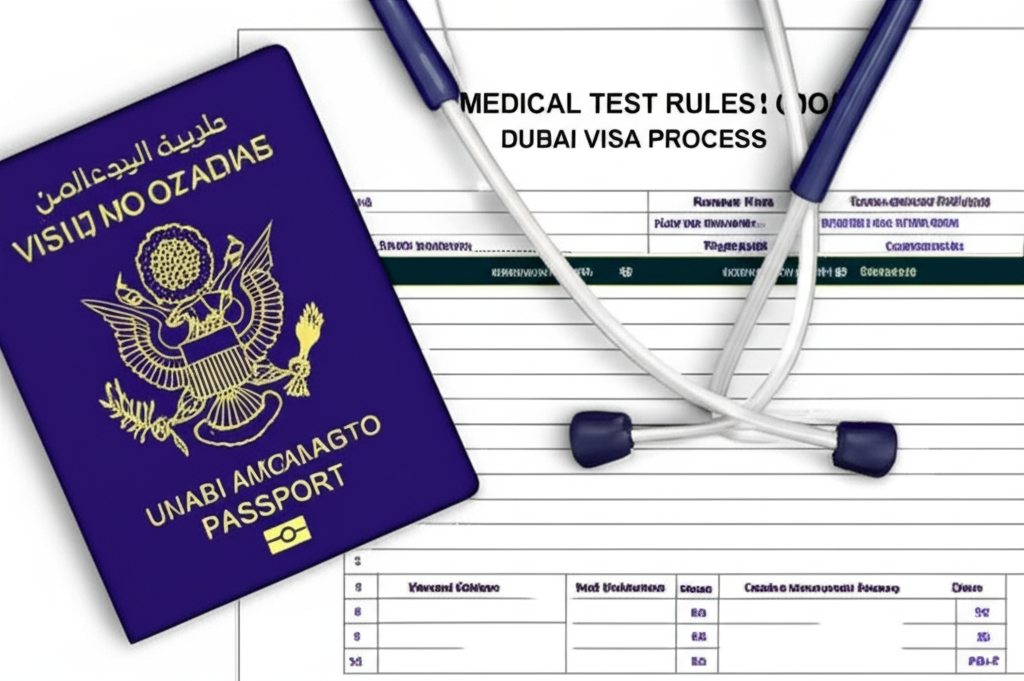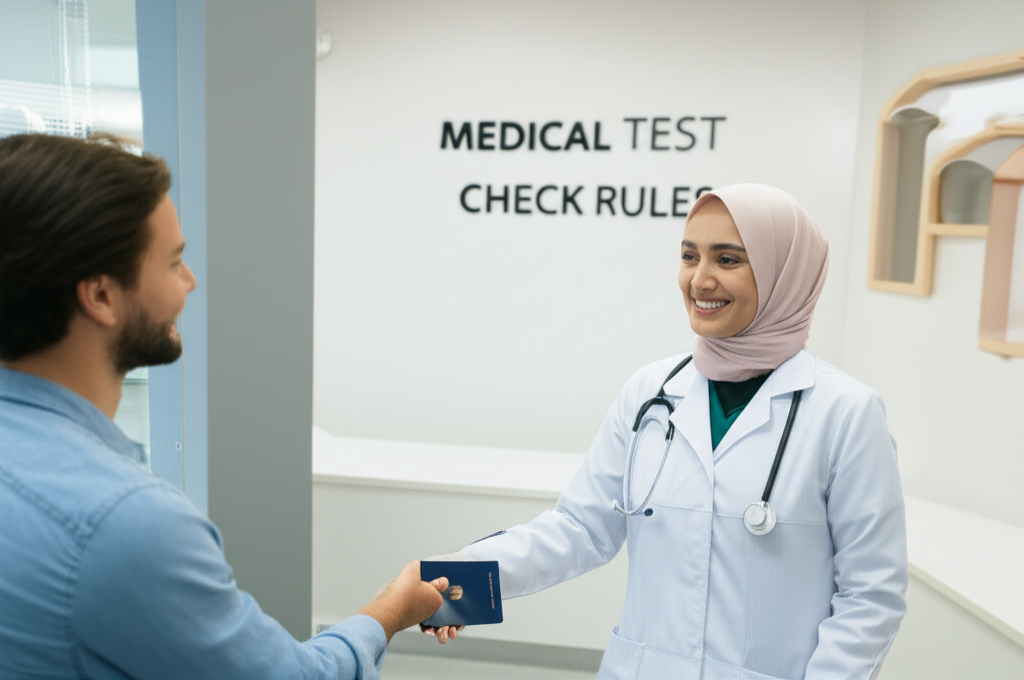- Why Even Have a Medical Test for Your Dubai Visa? The Big Picture
- The Core Requirements: What Medical Tests Are Mandatory for Your Dubai Visa?
- Non-Negotiables: The Vital Medical Tests
- Who Needs What? Different Strokes for Different Folks
- The Simple Dubai Visa Medical Process: What to Expect Step-by-Step
- Before You Go: Prepping for Your Appointment
- The Day of the Test: Walking Through It
Moving to a new country is a huge step, and heading to a dynamic hub like Dubai? That’s next-level exciting! You’re probably buzzing with anticipation, dreaming of the glittering skyline, new career opportunities, or just the incredible lifestyle. But then, as the paperwork starts piling up, a question inevitably pops into your head: “What’s the deal with the Dubai Visa Medical Test? Is it a big hurdle? What exactly do I need to know?”
We get it. The idea of a medical test for a visa can feel a bit daunting, and let’s be honest, bureaucratic processes aren’t exactly known for their crystal-clear instructions. You might be worried about what diseases they test for, how long it takes, or even if you could somehow fail and jeopardize your big move. Nobody wants that kind of stress.
Look, this isn’t rocket science, but you do need to pay attention to the details. The truth is, the medical test is a mandatory and non-negotiable part of the Dubai visa process. But here’s the good news: with the right information, it’s actually a pretty straightforward step. Forget the jargon and the guesswork. We’re going to cut through the noise, walk you through exactly what’s involved, and give you the real talk on how to make your Dubai Visa Medical Test experience as smooth as possible. No BS, just what you need to know to get it done right and move on to your exciting life in the UAE.

Why Even Have a Medical Test for Your Dubai Visa? The Big Picture
Before we dive into the nitty-gritty, let’s quickly touch on why this test is even a thing. It’s not just another piece of red tape to annoy you. The United Arab Emirates, and Dubai specifically, takes public health very seriously. Their commitment to maintaining a healthy environment for residents and visitors is paramount.
The mandatory health screening for all long-term visa applicants (whether you’re coming for work, family, or residency) is primarily a preventative measure. It’s designed to:
Protect Public Health: Prevent the spread of communicable diseases within the community.
Ensure Fitness for Work: Make sure individuals, especially those in specific job sectors, are healthy enough to perform their duties without risk to themselves or others.
Maintain High Health Standards: The UAE aims for a high standard of living, and public health is a cornerstone of that.

So, while it might feel like a hoop to jump through, understand that it’s a critical component of Dubai’s strategy to maintain a safe and healthy society for everyone.
The Core Requirements: What Medical Tests Are Mandatory for Your Dubai Visa?
Alright, let’s get down to brass tacks. You’re probably wondering, “What exactly are they looking for?” The primary focus of the Dubai Visa Medical Test is to screen for a handful of specific communicable diseases that could pose a public health risk.
Non-Negotiables: The Vital Medical Tests
There are a few key tests that every adult visa applicant must undergo. These are the absolute make-or-break elements of your medical fitness certificate.

Tuberculosis (TB): Chest X-Ray
This is a big one. You’ll get a chest X-ray to check for active or old TB lesions.
Here’s the critical part: If your X-ray shows active TB, your visa application will be rejected, and you’ll likely face deportation. No exceptions.
What if I had TB before? This is where it gets tricky. If you have evidence of old, inactive TB (fibrosis, scarring), you might be asked for further tests and potentially denied if it’s deemed a risk, or if it indicates prior active disease. The UAE has a “once declared medically unfit for TB, always unfit” policy for new residency visas, which has been eased slightly for renewals if it was previously inactive calcification, but it’s still a major consideration. Always consult with the authorities or a specialist if you have a history of TB.
HIV/AIDS: Blood Test
Similar to TB, a positive result for HIV/AIDS is an absolute disqualification for a new residency visa in Dubai and the entire UAE. There’s no appeal, and you will be deported.
Hepatitis B & C: Blood Test
The rules for Hepatitis B and C are a bit more nuanced than for HIV or active TB, and they depend heavily on your visa type and occupation.
For most visa types: Screening is done. If you test positive for Hepatitis B or C, it will generally not result in automatic deportation for most professions outside of specific high-risk categories.
High-Risk Occupations: However, if you’re applying for an employment visa in certain “high-risk” professions – think food handlers, nannies, barbers, hairdressers, beauty salon workers, and healthcare professionals – a positive result for Hepatitis B or C will lead to visa rejection and deportation. Why? Because these roles involve direct contact with the public, increasing the potential for transmission.
Treatment Requirement: For other professions, if you test positive for Hepatitis B, you might be required to undergo a course of treatment in the UAE and get vaccinated. For Hepatitis C, treatment might also be required, and it’s important to discuss this with the medical center.
Pregnancy Test: Urine Sample
For female applicants seeking an employment visa, a pregnancy test is typically mandatory.
The crucial point: If you are found to be pregnant, you generally cannot be granted an employment visa. This is not about moral judgment, but health and safety regulations for working during pregnancy in specific roles, and considerations for the employer.
Family Visa: If you’re coming on a dependent/family visa, pregnancy is usually not an issue. In fact, you’ll need a different set of tests (usually only HIV and TB) and often specific pre-natal care plans.
Who Needs What? Different Strokes for Different Folks
While the above tests are the core, certain circumstances might change what you need.
Employment Visa Holders: These are the most rigorously screened. All the above core tests apply, with the specific Hepatitis rules for high-risk jobs.
Family Visa (Dependents): If you’re sponsoring your spouse or children, they also need to undergo medical screening. The tests are usually similar, focusing on HIV and TB. For children, the requirements are often simplified and may not include X-rays for very young ones.
Specific Occupations: We touched on this, but certain jobs like healthcare workers, food industry employees, and even those in nurseries or fitness centers, might have additional checks or more stringent interpretations of existing rules. This is for the safety of the public they interact with.

The Simple Dubai Visa Medical Process: What to Expect Step-by-Step
Alright, so you know what they’re looking for. Now, let’s talk about how to get it done. The process itself is surprisingly organized, provided you know the steps.
Before You Go: Prepping for Your Appointment
Preparation is key to avoiding delays and unnecessary stress. Don’t just roll up; a little planning goes a long way.
Gather Your Documents:
Your original passport.
A copy of your entry permit or visa application form.
Two passport-sized photographs (white background, standard UAE visa photo spec).
Your Emirates ID (if you’re renewing or already have one).
Any relevant medical history documents, especially if you have chronic conditions or past illnesses they might ask about (though generally not required, it can be useful).
Booking Your Appointment:
You’ll typically go to an authorized medical fitness center approved by the Dubai Health Authority (DHA). Common ones include Preventive Medicine Department centers, some private hospitals (often more expensive but faster), and specialized screening centers.
You can often book an appointment online via the DHA website or simply walk in. Booking ahead helps manage your time, especially if you opt for an express service.
Internal Linking Opportunity: For a complete guide on how to navigate the DHA online portal for medical tests or Emirates ID applications, check out our [comprehensive guide to the UAE government services portal].
Fasting? Generally, for the standard visa medical tests (HIV, Hepatitis, TB X-ray), fasting is not required. You can eat and drink normally. If you have specific medical conditions or are doing other tests, always confirm with the center.
* What to Wear: Dress comfortably. You’ll need to briefly remove your top for the chest X-ray, so wear something easily unzipped or unbuttoned, or a simple t-shirt under layers.
The Day of the Test: Walking Through It
This is the actual doing part

